Best Java Full Stack Training Institute In Vijayawada
- Get Certified from the Best Java Full Stack Training Institute in Guntur
- Get trained by 10+ Years experienced trainers.
- 10+ real-time projects.
- Lab facility.
Students Enrolled
Duration
Get In Touch With Us
Table of Contents
Java Full Stack Course in Vijayawada
Nipuna Technologies is the best Java course in Vijayawada. This course is designed to train you from basic to advanced concepts of Java. By learning our java full stack course, you will master in key concepts like core java j2ee along with popular frameworks like Hibernate, Spring, & SOA. Java is widely used programming language across the globe as it provides diverse application from android application to web applications. Currently, there are many active job openings for Java. The worlds best companies are looking for certified Java professionals. Enroll in our best Java Training in Vijayawada and learn Java in a real-time environment with real-life case studies.
Nipuna Technologies offers the best Java Course in Vijayawada, aiming to provide you with comprehensive knowledge about the components and features of Java. Our team of expert trainers in Core Java boasts over 10+ years of experience in the field. They have meticulously designed the Java course curriculum to equip students with the skills to tackle real-time industry-based problems. Upon successful completion of the course, you will be awarded a Java course completion certificate from Nipuna Technologies. This Java certification will significantly enhance your prospects of securing jobs in Top MNCs. In addition to our Core Java Course Vijayawada, we also offer a Python Full Stack Course Vijayawada and a Hardware Networking Course Vijayawada to cater to diverse learning needs.

Job Opportunities After Completing Advanced Java Training in Vijayawada
Nipuna Technologies provides students a comprehensive to take your Java training so that they achieve their career goals confidently. We consider students as our responsibility & it does not end after the completion of this course and certification. We provide training with placement solutions to the students & our placement team schedules drives and also conducts mock interviews during the training for your career opportunities. Already, we have kept a moderate training fee to support students coming from all sections of society.
Java plays a significant role in software development and aims to create critical websites. It is the best and has turned into one of the high-demand programming languages across the globe, and it has maintained its popularity since its inception in the 90s. In addition to its widespread use, we also offer specialized courses to further enhance your skills, including the Machine Learning With Python Course in Vijayawada and the Python Core Advanced Course in Vijayawada. Moreover, for those looking to explore Java programming, we offer an Advanced Java Course in Vijayawada to cater to various learning needs.
Java Developer
Java programmer
Java Android Developer
Web developer
Database administrator
Java Developer
Java programmer
Java Android Developer
Web developer
Database administrator
Why Choose Nipuna Technologies for Java Training in Vijayawada?
Nipuna Technologies is one of the Best Advanced Java Training Institute in Vijayawada which provides theoretical as well as practical knowledge through training on live projects and a dedicated placement cell for all of our students. This course curriculum is designed in such a way that every student gets an in-depth understanding of Java.
The course curriculum at Nipuna Technologies is meticulously designed to cover all modules, from fundamental to advanced levels. This comprehensive training program is conducted by industrial experts with more than ten years of experience in handling live projects. Our state-of-the-art facilities include A/C Class Rooms, High-Configured Labs, and well-experienced trainers. We understand the diverse learning preferences of our students, and that’s why we offer both classroom and online training classes. This flexibility enables students to effectively tackle any difficulties they may encounter when entering the IT sector. In addition to our existing courses, we also provide specialized training options such as the 3Ds Max Course in Vijayawada and Android App Development Course in Vijayawada to cater to a wider range of interests and career aspirations.
Key Features

Practice Labs For Real-Time Learning
Practice Labs makes it easy for you to put your learning into practice in a safe environment that you can access anytime with a compatible PC, Browser and Internet connection.
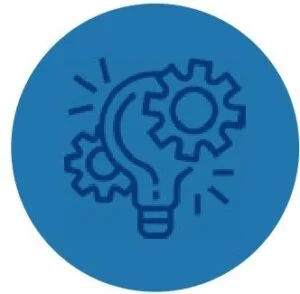
Live Project Training
We offer Live Projects and opportunity to take part in project design supported by industry partners including business and community organizations.
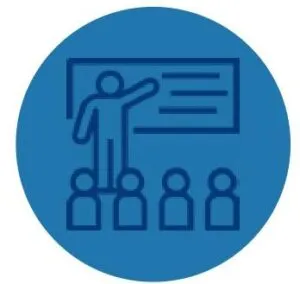
Classroom Training
We will use collaborative web conferencing with screen sharing to conduct highly interactive live online teaching sessions.
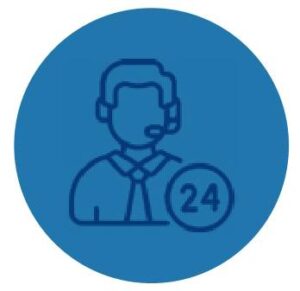
24/7 Support
Got queries? Our 24/7 support team will go extra mile so you can have easy and enjoyable experience with Nipuna Technologies on Slack which is a communication platform.

Job & Interview Assistance
Our interview assistance can help you overcome your fears and walk into your next interview with confidence and get your dream Job.

Internship After Course
Industry needs the best talent to stay afloat and thrive in today’s fast and ever-changing world, you will get a chance to do Internships and working closely that can provide a serious winwin for both Industry and students/trainees
Course Curriculum
List of all the topics which will be covered in Java Full Stack Course
- Basics of Java
- Java – What, Where and Why?
- History and Features of Java
- Internals of Java Program
- Difference between JDK,JRE and JVM
- Internal Details of JVM
- Variable and Data Type
- Unicode System
- Naming Convention
- Advantage of OOPs
- Object and Class
- Method Overloading
- Constructor
- static variable, method and block
- this keyword
- Inheritance (IS-A)
- Aggregation and Composition(HAS-A)
- Method Overriding
- Covariant Return Type
- super keyword
- Instance Initializer block
- final keyword
- Runtime Polymorphism
- static and Dynamic binding
- Abstract class and Interface
- Downcasting with instance of operator
- Package and Access Modifiers
- Encapsulation
- Object class
- Object Cloning
- Java Array
- Call By Value and Call By Reference
- String : What and Why?
- Immutable String
- String Comparison
- String Concatenation
- Substring
- Methods of String class
- String Buffer class
- String Builder class
- Creating Immutable class
- to String method
- String Tokenizer class
- Exception Handling: What and Why?
- try and catch block
- Multiple catch block
- Nested try
- finally block
- throw keyword
- Exception Propagation
- throws keyword
- Exception Handling with Method Overriding
- Custom Exception
- Nested Class : What and Why?
- Member Inner class
- Anonymous Inner class
- Local Inner class
- static nested class
- Nested Interface
- Multithreading : What and Why?
- Life Cycle of a Thread
- Creating Thread
- Thread Scheduler
- Sleeping a thread
- Joining a thread
- Thread Priority
- Daemon Thread
- Thread Pooling
- Thread Group
- Shutdown Hook
- Performing multiple task by multiple thread
- Garbage Collection
- Runnable class
- Synchronization : What and Why?
- synchronized method
- synchronized block
- static synchronization
- Deadlock
- Inter-thread Communication
- Interrupting Thread
- ByteArrayOutputStream
- SequenceInputStream
- BufferedOutputStream & Buffered Input Stream
- File Writer & File Reader
- Char Array Writer
- Input from keyboard by Input Stream Reader
- Input from keyboard by Console
- Input from keyboard by Scanner
- Print Stream class
- Print Writer class
- Compressing and Uncompressing File
- Reading and Writing data simultaneously
- Data Input Stream and Data Output Stream
- Stream Tokenizer class
- Serialization & Deserialization
- Serialization with IS-A and Has-A
- transient keyword
- Socket Programming
- URL class
- Displaying data of a web page
- Inet Address class
- Data gram Socket and Data gram Packet
- Two way communication
- AWT Controls
- Event Handling
- Event classes and Listener Interfaces
- Adapter classes
- Creating Games and Applications
- Border Layout
- Grid Layout
- Flow Layout
- Box Layout
- Card Layout
- Life Cycle of Applet
- Graphics in Applet
- Displaying image in Applet
- Animation in Applet
- Event Handling in Applet
- JApplet class
- Painting in Applet
- Digital Clock in Applet
- Analog Clock in Applet
- Parameter in Applet
- Applet Communication
- Creating Games
- Collection Framework
- Array List class
- Linked List class
- List Iterator interface
- HashSet class
- Linked HashSet class
- Tree Set class
- Priority Queue class
- Array Queue class
- Map interface
- HashMap class
- Linked HashMap class
- Tree Map class
- Hash table class
- Comparable and Comparator
- Properties class
- JDBC Drivers
- Steps to connect to the database
- Connectivity with Oracle
- Connectivity with MySQL
- Connectivity with Access without DSN
- Driver Manager
- Connection interface
- Statement interface
- Result Set interface
- Prepared Statement
- Result Set Meta Data
- Database Meta Data
- Storing image
- Retrieving image
- Storing file
- Retrieving file
- Stored procedures and functions
- Transaction Management
- Batch Processing
HTML 5
- Introduction to HTML
- HTML Tags
- Creating Forms
- Creating tables
- Managing home page
CSS
- Introduction to CSS
- Three ways to use CSS
- CSS Properties
- Designing website
- Working with Templates
- Introduction to JavaScript
- Three ways to use JavaScript
- Working with events
- Client-side Validation
- Introduction to jQuery
- Validation using jQuery
- jQuery Forms
- jQuery Examples
- Introduction to AJAX
- Servlet and JSP with AJAX
- Interacting with database
- Servlet: What and Why?
- Basics of Web
- Servlet API
- Servlet Interface
- Generic Servlet
- Http Servlet
- Servlet Life Cycle
- Working with Apache Tomcat Server
- Steps to create a servlet in Tomcat
- How servlet works?
- servlet in My eclipse
- servlet in Eclipse
- servlet in Net beans
- Servlet Request methods
- Registration example with DB
- Request Dispatcher
- send Redirect
- Servlet Config methods
- Servlet Config example
- Basics of JSP
- Life cycle of JSP
- JSP API
- JSP in Eclipse and other IDE s
Scripting elements
- scriptlet tag
- expression tag
- declaration tag
9 Implicit Objects
- out
- request
- response
- config
- application
- session
- page Context
- page
- exception
Directive Elements
- page directive
- include directive
- taglib directive
- Exception Handling
Action Elements
- jsp:forward
- jsp:include
- Bean class
- jsp:useBean
- jsp:setProperty & jsp:setProperty
- Displaying applet in JSP
Expression Language
MVC in JSP
JSTL
Custom tags
- Custom Tag : What and Why?
- Custom Tag API?
- Custom Tag Example
- Attributes
- Iteration
- Custom URI
JavaMail API
- Sending Email
- Sending email through Gmail server
- Receiving Email
- Sending HTML content
Struts 2
- Basics of Struts2
- Struts : What and Why?
- Model1 vs Model2
- Struts2 Features
- Steps to create Struts2 application
- Understanding Action class
- Understanding struts.xml file
- Struts2 in Eclipse IDE
- Struts2 in My eclipse IDE
Core Components
- Interceptors
- Value Stack
- Action Context
- Action Invocation
- OGNL
Struts2 Action
- Action Interface
- Action Support class
Struts2 Configuration
- multi configuration
- multi namespace
Interceptors
- Custom Interceptor : Life Cycle of Interceptor
- params interceptor
- execAndWait interceptor
- prepare interceptor
- model Driven interceptor
- exception interceptor
- file Upload interceptor
Struts 2 Validation
- Custom Validation : workflow interceptor
- Input Validation : validation interceptor
- Ajax Validation : jsonValidation interceptor
Aware Interfaces
- Servlet Action Context
- Session Aware
- Login and Logout Application
- Servlet Context Aware
Struts2 with I18N
Zero Configuration
- By convention
- By annotation
Struts2 with Tiles2
Hibernate with Struts2
Spring with Struts2
Project Development in Struts2
Working with Servers
Servers
- Apache Tomcat
- Web logic Server
Introduction to Java j2EE
- The Need for JavaEE.
- Overview on the JavaEE Architecture
- 1 tier
- 2 tier
- 3 tier
- N tier
- JavaEE Key Standards
Introduction to EJB3
- The EJB Model
- Key Services of the Application Server
Developing Session Beans
- Stateless Session Beans
- Stateful Session Beans
- Packaging
- Writing Clients
Using Dependency Injection
- No More JNDI
- Injection of EJBContext
JMS
- JMS Overview
- JMS Messaging Domains
- Example of JMS using Queue
- Example of JMS using Topic
Message Driven Beans
Persistence Introduction to JPA
- Object Relational Mapping
- Mapping configurations
- Embedded Objects
- EJBQL
4. Spring Syllabus
Spring
- Basics of Spring
- What is Spring
- Spring Modules
- Spring Application
- Spring in My eclipse
- Spring in Eclipse
IOC container
Dependency Injection
- Constructor Injection
- CI Dependent Object
- CI with collection
- CI with Map
- CI Inheriting Bean
- Setter Injection
- SI Dependent Object
- SI with Collection
- SI with Map
- CI vs SI
- Auto wiring
- Factory Method
Spring AOP
- AOP Terminology
- AOP Implementations
- Pointcut
- Advices
Spring JDBC
- Basics of Spring
- What is Spring
- Spring Modules
- Spring Application
Spring
- JDBC Template Example
- Prepared Statement
- Result Set Extractor
- Row Mapper
- Named Parameter
- Simple JDBC Template
Spring with ORM
- Spring with Hibernate
- Spring with JPA
SpEL
- SpEL Examples
- Operators in SpEL
- variable in SpEL
Spring 3 MVC
Remoting with Spring
- Spring with RMI
- Http Invoker
- Hessian
- Burlap
- Spring with JMS
OXM Frameworks
- Spring with JAXB
- Spring with Xstream
- Spring with Castor
Spring Java Mail
Web Integration
- Spring with Struts2
- Login and Logout Application
Tools & Platforms
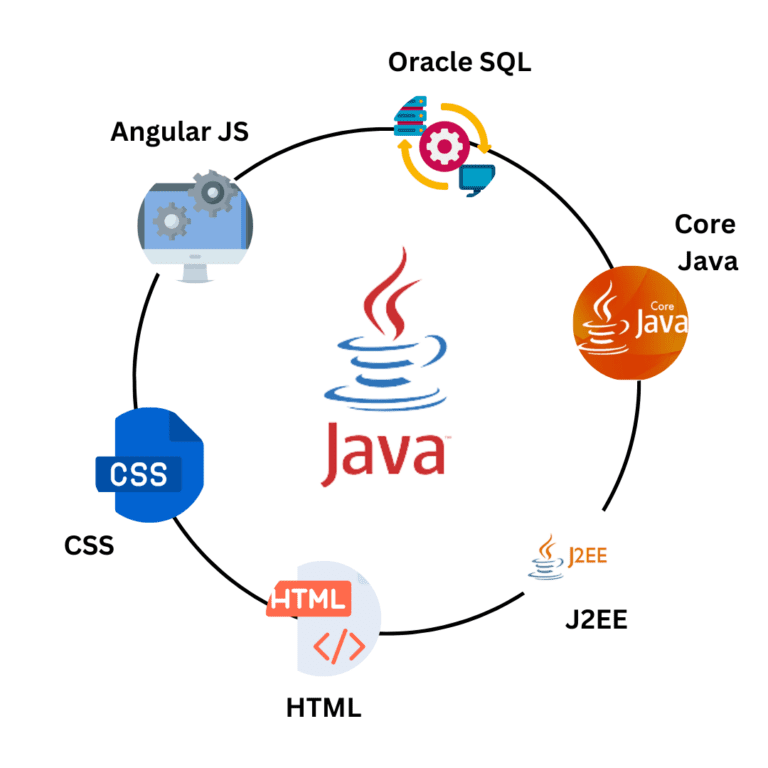
Our Reviews







Our Reviews




Certifications
CERTIFICATION
Our training is based on latest cutting-edge infrastructure technology which makes you ready for the industry. Nipuna Technologies will present this certificate to students or employee trainees upon successful completion of the course which will encourage and add to trainee’s resume to explore a lot of opportunities beyond position.
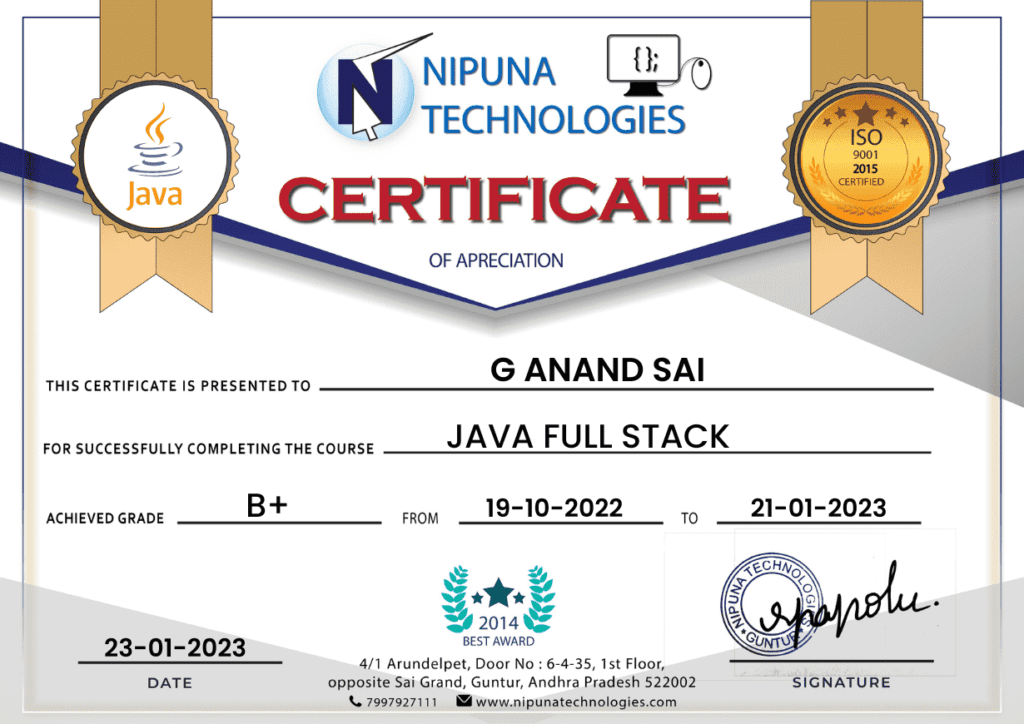
Frequently Asked Questions
Approximately 6 Months.
Yes, all our students get certificate from institute after completing the Java training program at Nipuna Technologies.
After completion of the course we will conduct an exam, and if you get 80% or more in the exam you will get Nipuna Technologies Certified Professional Certificate.
- You will never miss any session. You can select any one of the two options:
- 1. View the Java class recordings that we send through mail daily.
- 2.You can attend the missed session of the Java coaching in any other live batch.
Our Location:
Nipuna Technologies Vijayawada
- Door No : 40-27-88/1, 3rd Floor, Lohia Towers, KP Nagar, Opposite Nirmala Convent, Vijayawada-520010
- Monday-Sunday: 7am-10pm















